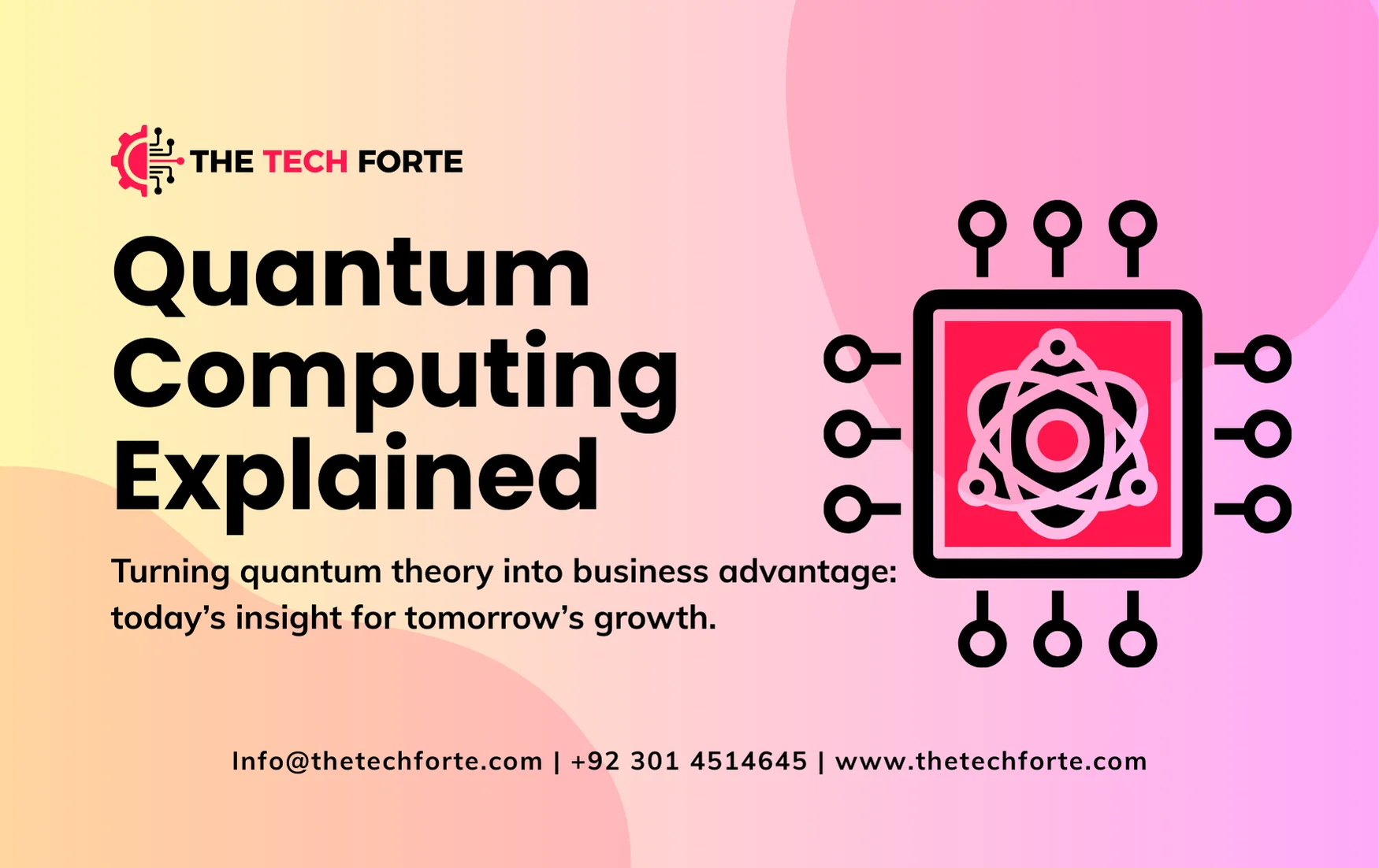
Quantum Computing Explained: What It Means for Businesses
Ten years ago, quantum computing seemed to be something kept in physics publications or maybe shown in a science fiction film. Today, it’s making its way into strategic papers, investor calls, and boardroom slides in the actual world. Big names like IBM, Google, and Microsoft are building systems you can actually try through the cloud. Startups are popping up with focused applications. And governments are pouring billions into research, treating it like the next great race after artificial intelligence.
If you’re running a business, the natural question is: what does this mean for us? The reality is that quantum computing is not “tomorrow’s toy.” While the most powerful machines are still in labs, companies that ignore the technology now risk being caught flat-footed when practical use cases arrive.
Quantum Computing in Plain Terms:
Let’s cut through the jargon. Classical computers use bits that can be either 0 or 1. They’re like light switches: on or off. Quantum computers use qubits, which are a type of quantum computing entity. Superposition allows a qubit to be both at once until it is observed—that is, 0, 1. Think about tossing a coin: it is fundamentally heads and tails while it is spinning.
Now add entanglement, a phenomenon whereby two qubits become entangled. Change one, and the other reacts instantly—even if they’re miles apart. This “spooky action at a distance,” as Einstein called it, is what gives quantum mechanics its unique edge.
- Shor’s Algorithm could one day unravel encryption methods we trust today.
- Grover’s Algorithm might speed up search and optimization tasks dramatically.
- And researchers are experimenting with measurement-based quantum computing, where computations happen through carefully designed measurement patterns instead of traditional circuits.
The practical takeaway? Quantum systems can tackle problems that classical supercomputers would need centuries to solve. For a business leader, that means moving from “What is it?” to “How soon will it matter to me?”
Market & Investment Landscape:
Quantum is now a worldwide race instead of only a scientific endeavor. By 2030, the quantum market could be worth tens of billions of dollars, analysts estimate. Each starting national quantum computing program, nations like the U.S., China, and members of the EU are battling it toughly.
- IBM has been particularly visible, showing off its progress with the IBM quantum computing piece and making devices available online.
- Training is part of the story, too. You’ll find programs like IBM quantum computing certification and even IBM quantum computing internship opportunities to build the workforce of tomorrow.
- Venture capital money is pouring into startups working on hardware, software, and algorithms.
This rapid investment means one thing: even if the “big breakthrough” hasn’t arrived yet, the momentum is unstoppable. Businesses that monitor the ecosystem will be ideally placed for the popularization of quantum applications.
Enterprise Opportunities and Use Cases:
Then what businesses really could use quantum computing for is this? The opportunities span multiple industries:
- Pharma & Chemistry: Simulating molecules for drug discovery, something classical computers struggle with.
- Finance: Faster portfolio optimization, fraud detection, and risk analysis.
- Route scheduling and planning at a level that today’s instruments cannot match.
- Finding fresh alloys, superconductors, or energy-efficient materials.
Distributed quantum computing—linking several quantum systems together, like a network of brains working in sync—offers another intriguing direction. This could boost performance before we have one massive, error-free machine.
The key for executives is not to ask, “Will quantum matter to my industry?” The smarter question is, “Which problems in my industry are so hard right now that quantum could unlock them?”
Quantum Risks & Cybersecurity Threats:
Every new technology comes with risks, and quantum ones are serious. The biggest fear? Encryption. Public-key cryptography today depends on issues too challenging for even supercomputers to solve rapidly. But a quantum computer operating Shor’s algorithm might crack those passwords in hours. That suggests the future could contain vulnerabilities in the data we encrypt right now.
- Businesses and governments are vying to adopt post-quantum cryptography (PQC)
- Some are also evaluating quantum key distribution (QKD) for ultra-secure communication.
- And yes, if you’ve asked, “How much faster is a quantum computer?”—for certain tasks like factoring, the answer is astronomically faster than anything we’ve seen.
For businesses, the urgency is simple: start planning a move to quantum-safe encryption now. Waiting until it’s too late could mean years of sensitive data suddenly exposed.
Challenges in Scaling Quantum Adoption:
The obstacles are great if you’re wondering why we’re not all using quantum computers already. Though strong in theory, noisy and error-prone in reality, current systems belong to the NISQ era (Noisy Intermediate-Scale Quantum).
- Qubits are delicate and lose information rapidly.
- Scale: Still, building thousands of dependable qubits.
- Costs: These machines need extreme cooling, often near absolute zero, which makes them expensive to run.
And no, to answer a fun but common question: “Can quantum computers run games?” Not really. They’re not built for running Fortnite or Call of Duty. They’re built for solving specialized, insanely complex problems.
That’s the mindset businesses should adopt: don’t think of quantum as replacing laptops—think of it as a tool for breakthroughs where classical systems hit a wall.
Beyond Technology — Ethics, Policy & Sustainability
Quantum’s impact goes far beyond computing.
- Ethics: Imagine the surveillance potential if quantum-enhanced AI falls into the wrong hands.
- Policy: Governments are fighting for leadership, therefore increasing the divide between technology “haves” and “have-nots.”
- Sustainability: Particularly for cooling, quantum computers use a lot of energy. This raises questions about environmental impact.
In other words, quantum isn’t just a tech race. It also presents ethical, geopolitical, and sustainability issues. Businesses should consider responsibility in addition to return on investment.
Building Quantum Readiness in Enterprises:
So, how do you prepare your company? You don’t need a lab full of physicists, but you do need a plan.
- Identify opportunities: Where could quantum add value in your industry?
- Experiment early: Partner with cloud providers to run pilot projects.
- Evaluate vendors: Options range from IBM and AWS Braket to startups with niche expertise.
- Develop talent: Encourage employees to explore learning paths, from an MS in quantum computing to certifications and workshops.
The businesses that win in the quantum era won’t necessarily be the biggest—they’ll be the ones who got ready first.
Developers & Learning Resources:
Quantum isn’t just for executives. Adoption depends on developers; therefore, the learning curve is becoming less steep.
- Free usage abounds in open-source tools, including Qiskit (IBM), Cirq (Google), and Pennylane (Xanadu).
- Programs like IBM quantum computing certification enable experts to verify their competence.
- Students and young engineers can apply for opportunities like an IBM quantum computing internship to get real-world experience.
We’re not yet at the stage of personal quantum computers—but through cloud platforms, anyone with curiosity can run experiments on real devices. That’s a huge leap from where we were just five years ago.
The Road Ahead — Future Scenarios
What’s next? A few possibilities stand out:
- Quantum + AI: Training models in ways we can’t imagine today.
- National security: Quantum will shape how governments defend—and attack—digital infrastructure.
- Democratization: As access grows, even small businesses will have the chance to experiment through the cloud.
A photograph of a quantum computer shows racks of cables, control systems, and a gold chandelier-like core housed in a freezer for the time being. That image, however, might seem as archaic as a 1980s mainframe does today in 10 or 20 years.
Finally: Getting Ready for the Quantum Age
It is a technology on the verge of changing sectors ranging from finance and logistics to pharmaceuticals and cybersecurity, not just a curiosity in a physics class. Although the breakthroughs will not come overnight, the momentum is evident.
For businesses, the right approach is balance. Neither disregard the signs nor fall for the hoopla. Invest in employee training, investigate small pilot projects, and note the destination of companies like IBM, Google, and others. Early preparation will enable businesses to lead when quantum utility finally shows up rather than only adjusting.






